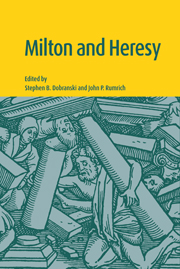Book contents
- Frontmatter
- Contents
- List of contributors
- Acknowledgments
- Abbreviations
- Introduction: Heretical Milton
- PART I HERETICAL THEOLOGY
- 1 Milton on heresy
- 2 Milton's antiprelatical tracts and the marginality of doctrine
- 3 How radical was the young Milton?
- PART II HERESY AND CONSEQUENCES
- PART III HERESY AND COMMUNITY
- PART IV READERS OF HERESY
- Index
1 - Milton on heresy
Published online by Cambridge University Press: 10 October 2009
- Frontmatter
- Contents
- List of contributors
- Acknowledgments
- Abbreviations
- Introduction: Heretical Milton
- PART I HERETICAL THEOLOGY
- 1 Milton on heresy
- 2 Milton's antiprelatical tracts and the marginality of doctrine
- 3 How radical was the young Milton?
- PART II HERESY AND CONSEQUENCES
- PART III HERESY AND COMMUNITY
- PART IV READERS OF HERESY
- Index
Summary
In introducing his study, Keywords, which he calls “an inquiry into a vocabulary,” Raymond Williams tells how his lexical items came to impress him with a dual “significance.” On the one hand, he says, they functioned as “binding words in certain activities and their interpretation” and, on the other, as “indicative words in certain forms of thought.” As such, these keywords posed “a problem of vocabulary, in two senses: the available and developing meanings of known words, which needed to be set down; and the explicit but as often implicit connections which people were making, again and again, in … particular formations of meaning–ways not only of discussing but, at another level, of seeing … central experiences.” “Every word which I have included,” adds Williams, “has at some time, in the course of some argument, virtually forced itself on my attention because the problems of its meanings seemed to me inextricably bound up with the problems it was being used to discuss.”
As with Williams's keywords generally, so too in particular, I want to argue, with Milton's use of the word “heresy” and its derivatives (“heretic,” “heretical,” “heretically,” and the like). I claim that this Miltonic term yields exceptionally rich corroboration of an important fact about keywords in their historical and sociolinguistic contexts – namely, that apparently individualistic and idiosyncratic inflections like Milton's not only do not resist, but indeed require the accrued polyvalence of cultural meanings in order to achieve their special Miltonic force at strategic points in his prose.
- Type
- Chapter
- Information
- Milton and Heresy , pp. 21 - 38Publisher: Cambridge University PressPrint publication year: 1998
- 5
- Cited by



